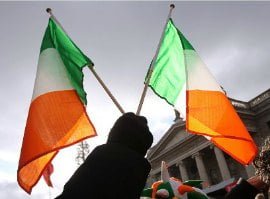News that the IMF might consider allowing the Irish government to pay off a large chunk of the bailout debt will no doubt be heralded as a great victory for the Coalition in Ireland. Séamus Loughlin from Fightback Ireland explains the reality: that the impact of this deal will only be felt as a ripple on the balance sheet.
News that the IMF might consider allowing the Irish government to pay off a large chunk of the bailout debt will no doubt be heralded as a great victory for the Coalition in Ireland. But the reality is that the greatest impact of this deal will only be felt as a ripple on the balance sheet.
The deal – which would require the entire group of Eurozone countries plus the UK, Denmark and Sweden to sign it off – would net maybe €20m for every €1bn repaid. The rub, of course, is that the damage to working class people as a result of the austerity continues unabated. €2.5bn was taken out of the economy at the last budget, the impact of which will be felt in lower demand in the economy, more job losses, and more poverty.
Even in the event that the deal was agreed, the impact on the state finances would be relatively small. The government would need to pay off some €15bn to save €300m over a period of years. Of far more importance to the state finances in the medium term is the development of the world economy and particularly the Eurozone.
On the one hand the Eurozone economies are carrying colossal debts, as the Irish Times reported on July 22nd:
“Euro zone public debt rose to 93.9 per cent of economic output in the first quarter of this year, approaching the peak it is expected to reach later in 2014, official data showed on Tuesday.
“Government debt of the 18 countries sharing the euro stood at €9.055 trillion in the first three months of this year, compared to €8.905 trillion in the last quarter of 2013, the EU’s statistics office Eurostat said.” (Euro zone’s debt rises in first quarter, set to peak this year)
Meanwhile, economic growth is fragile, with Eurostat reporting 0.2% growth in the first quarter of the year (down from a projected 0.4&) and lower growth also in the last quarter of 2013, with 0.2% downgraded from the previous estimate of 0.3%.
Weakness in the US economy, which is in the midst of its most sluggish recovery in history, and a number of other downgrades of predicted growth have resulted in the IMF lowering growth expectations for the world economy to 2.9%, roughly half the pre-2008 figure. This will inevitably continue to impact on world trade. For Ireland, the combination of a weak Eurozone economy and poor trade conditions will further limit the chances of the Irish economy exporting its way out of the crisis. After all, Ireland exports some 80% of all it produces.
Yet the Central Bank is estimating a 2.5% growth rate this year. This seems high by the standards of the Eurozone and will be sensitive to world trade conditions. The political crisis between the US and European union on one side, and Russia on the other, could easily impact on the Eurozone economies in particular, especially if the oil and gas are turned off. A new recession is not ruled out in the near future.
Against that background, it is unlikely that the austerity will come to an end for years. Just a few years ago, the political outlook of all the classes in Ireland was shaped by the Celtic Tiger years, when the economy almost doubled in size in 12 years. Now after 6 years of crisis, it is the austerity that still dominates the state and the political debate in the Dáil.
The Labour leaders have tied themselves to the coat tails of Fine Gael and hence to the politics of austerity. Neither Fianna Fáil nor Sinn Féin have any answer to the crisis. The left are divided against each other. The perspective for the Irish working class is for further attacks on living standards, for more austerity. Without a clear socialist alternative that argues for a fundamental break with capitalism, the anger and frustration of working people will have no outlet.
Connolly explained long ago the role of the Irish Capitalist and landlord classes in relation to British imperialism. The US and European capitalists have as much power over Ireland now as the British Capitalists, but Connolly’s points are just as clear:
“An Irish Republic, the only purely political change in Ireland worth crossing the street for, will never be realised except by a revolutionary party that proceeds upon the premise that the capitalist and the landlord classes in town and country in Ireland are criminal accomplices with the British government, in the enslavement and subjection of the nation. Such a revolutionary party must be socialist, and from socialism alone can the salvation of Ireland come.” (James Connolly, The Harp, March 1909)






